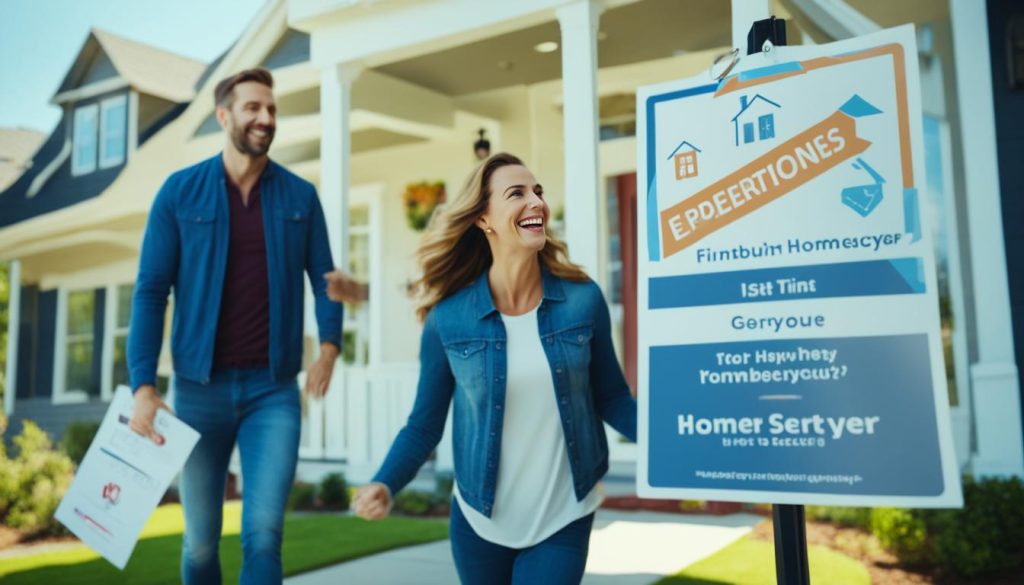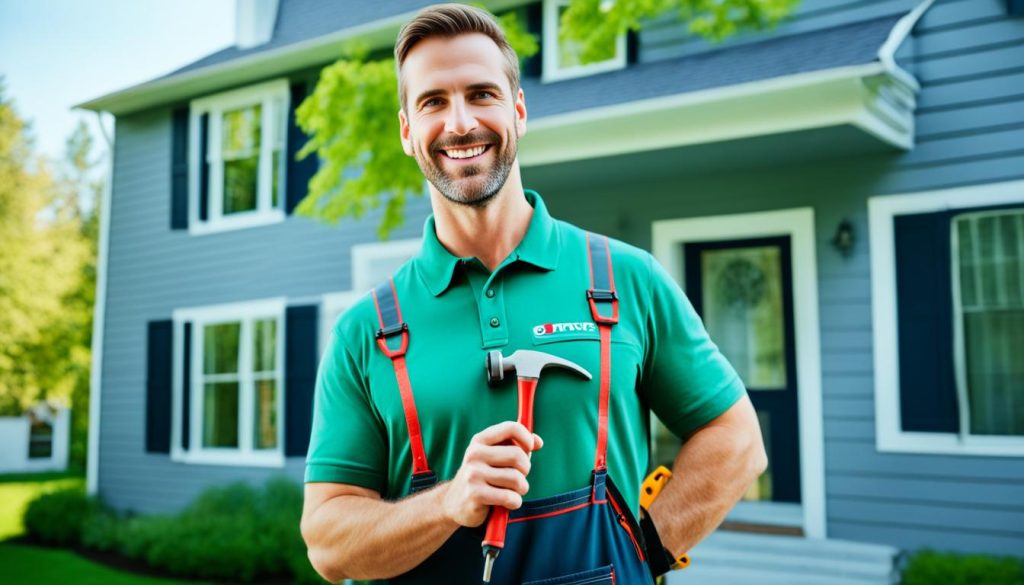Buying your first home is thrilling but can also be daunting, especially when thinking about the costs. First-time homebuyer programs can ease these financial concerns and guide you to homeownership. These programs offer help with down payments, low-interest loans, and mortgage credit certificates. By learning about these programs and their requirements, first-time buyers can feel more confident and reach their dream of owning a home.
Key Takeaways
- First-time homebuyer programs offer financial assistance to help with the upfront costs of buying a home.
- Down payments can typically range from 3% to 6% of the home’s purchase price, and first-time buyers can access grants and low-interest loans to cover these costs1.
- Closing costs, which are usually around 3% to 6% of the total loan amount, can also be covered through government-sponsored or private programs1.
- First-time homebuyer loans often have more flexible requirements, such as lower down payments and credit scores2.
- Eligible first-time buyers may qualify for state-specific and local programs that provide additional financial assistance.
Understanding First-Time Homebuyer Programs
Buying your first home can feel overwhelming. But, there are programs to help make it easier and cheaper. These programs offer down payment help, low-interest loans, and more to help you buy your dream home.
What are First-Time Homebuyer Programs?
These programs are made by government agencies, non-profits, and banks to help first-time homebuyers. They give financial help, educational tools, and other perks to make buying a home possible3.
Benefits of First-Time Homebuyer Programs
These programs make buying a home more affordable and reduce upfront costs. They offer down payment help, low-interest loans, and more. Plus, they provide courses on buying a home, budgeting, and keeping up with maintenance3.
The Florida Housing Finance Corporation (FHFC) has programs for first-time buyers. They offer mortgage loans, down payment help, and a mortgage certificate program4. These can really help first-time buyers in a rising housing market.
“First-time homebuyer programs are a game-changer for those looking to take the leap into homeownership. They provide the financial support and educational resources needed to navigate the process with confidence.”
First-time homebuyer programs can help anyone, whether you’re young, have a growing family, or are empty nesters. By learning about these programs and their benefits, you can start working towards owning your dream home354.
Types of First-Time Homebuyer Programs
First-time homebuyer programs offer different types of help. They make buying a home easier with down payment help, low-interest loans, and mortgage credit certificates6. These programs can make owning a home possible for many people6.
Down Payment Assistance Programs
Down payment assistance programs help with the upfront costs of buying a home. They give low-interest loans or grants to those who can afford monthly payments but not a down payment6. For example, the Connecticut Housing Finance Authority (CHFA) has a program for down payments and closing costs6.
Low-Interest Loan Programs
Low-interest loan programs, like FHA, VA, and USDA loans, help first-time buyers with affordable financing7. They have lower interest rates, smaller down payments, and less insurance costs. This makes buying a home easier for those with less money6. CHFA’s HFA Advantage and HFA Preferred Loans offer savings on insurance and lower interest rates for buyers in certain areas6.
Mortgage Credit Certificates
Mortgage credit certificates give tax credits to first-time buyers, reducing the cost of owning a home7. These credits can lower the buyer’s taxes, making mortgage payments easier to manage6. CHFA’s Time to Own Forgivable Down Payment Assistanceoffers loans up to $50,000 for down payments and closing costs in some areas8.
These programs are offered at federal, state, and local levels, giving buyers many options6. By learning about these programs, buyers can find the help they need to own a home7.

Eligibility Requirements for First-Time Homebuyer Programs
If you’re a first-time homebuyer, the rules for getting help can seem hard to follow. But it’s key to know these rules to get the help you need to own a home9.
Many programs for first-time buyers have income limits based on where you live. This makes sure the help goes to those who need it most10. You’ll also need a credit score of 660 to 680, depending on the loan type9. Some programs also limit the type and location of the property, like single-family homes or condos in certain areas11.
Another thing to think about is the down payment. Some programs help with down payments up to 10% of the home’s price9. Others might ask for a 3.5% down payment for FHA loans or no down payment for VA and USDA loans9.
To be seen as a first-time buyer, you usually can’t have owned or lived in a home in the last three years10. In some cases, you can’t have had any home ownership in the last seven years10.
Many programs also require you to finish homebuyer education courses10. These courses make sure you know what you’re getting into when buying a home11.
Learning about the rules for first-time homebuyer programs can help you get the support you need. This way, you can make your dream of owning a home come true91011.
“The key to unlocking the door to homeownership for first-time buyers lies in understanding and meeting the eligibility criteria set forth by these valuable programs.”
The Homebuying Process for First-Time Buyers
Buying a home for the first time can feel overwhelming, but it can also be exciting. The main steps include getting pre-approved for a mortgage, finding a good realtor, making a strong offer, and closing the deal12.
Getting Pre-Approved
First, you need to get pre-approved for a mortgage. This means working with a lender to figure out how much you can borrow. They look at your credit score and what you can afford. You’ll need a credit score of at least 620, sometimes more13.
Down payments can be as low as 3% to 3.5%, depending on the loan type. First-time buyers often get loans with lower interest rates and less mortgage insurance13.
Working with a Realtor
After getting pre-approved, find a realtor who knows the local market. They help you find the right property, guide you through making an offer, and make sure everything goes smoothly12. They also share info on home prices, recent sales, and what the area is like12.
Making an Offer
When you find a home, your realtor will help you make a strong offer. They’ll help set the price, negotiate, and get all the paperwork ready12. You’ll need to put down earnest money, usually 1% of the home’s price, with your offer14.
Closing the Deal
The last step is closing the deal. This means finalizing your mortgage, signing papers, and becoming a homeowner. Closing costs are 2% to 5% of the home’s price, so plan for them14. First-time buyers can use special programs and support to help them succeed12.
The homebuying process might seem tough, but it can be rewarding with the right help. Use first-time buyer programs and a good realtor to make it easier. This way, you can confidently buy your dream home12.
First-Time Homebuyer Programs in Your State
Buying your first home can be thrilling but also a bit overwhelming. Luckily, many states and local areas have special programs for first-time buyers like you. These programs can offer extra help to make buying a home easier.
State-Specific Programs
In South Carolina, the SC Housing agency has a Homebuyer Program with low, fixed interest rates15. This helps make loan payments affordable over time. The program also offers Down Payment Assistance to help with saving for the down payment and other costs15. SC Housing focuses on helping first-time buyers with various down payment programs15.
The median home sale price in South Carolina was $388,100 in May 2024, up 5.1% from last year16. The average credit score is 69616, and the minimum down payment is 3%, or $11,643 based on the average home sale price16. A 20% down payment would be $77,62016.
The Palmetto Home Advantage program offers up to 4% down payment assistance, with a 0% interest rate on a ten-year loan16. The County First rural home loan program provides up to $8,500 in down payment help for buyers in certain areas16. The SC Mortgage Tax Credit Program gives a tax credit of up to $2,000 a year for the loan’s life for eligible buyers16.
Local Programs
Local areas in South Carolina also have their own programs for first-time buyers. For instance, Lexington County’s Homeownership Assistance Program offers up to $5,000 for down payment and closing costs17. To avoid paying back the help, you must live in the home for at least 5 years17. The program has income limits set by HUD17. You can learn more by contacting the Lexington County Community Development Department17.
Working with your lender and real estate agent can help you find and use these state and local programs. They can give you the extra support you need to buy your home.

Preparing for Homeownership
Becoming a homeowner is a big step, but it needs careful planning. First-time buyers should work on building credit, saving for a down payment, and planning for homeownership costs. These steps help you get better loan terms and set you up for success.
Building Your Credit
Your credit score is key to getting good loan options and rates. Try to have a credit score of 620 or higher for better rates18. Improve your credit by paying on time, keeping your credit use low, and checking your credit report for mistakes.
Saving for a Down Payment
A 20% down payment is ideal, but you might get away with 3% on some loans18. Expect to pay 2% to 5% in closing costs18. Start saving early and look into programs that help with down payments.
Budgeting for Homeownership Costs
You’ll need to budget for more than just mortgage payments. Think about property taxes, insurance, and maintenance costs too. Getting pre-approved for a mortgage shows how much you can afford and helps you stick to your budget18. Choose between a 30-year or 15-year mortgage, but think about the long-term effects of each choice.

Working on your credit, saving for a down payment, and planning for costs will help you become a homeowner. With the right steps and advice, this journey can be rewarding18.
Conclusion
Starting your journey to homeownership can be tough, but first-time homebuyer programs can help. They make it easier to get past the financial challenges of buying your first home19. By learning about the different kinds of help, who can get it, and how to buy a home, you’ll feel ready and confident.
These programs offer down payment help, low-interest loans, and mortgage credit certificates. They give you the tools and advice you need to make owning a home possible20. By using these programs and getting ready for homeownership, you start a new chapter in your life. You’ll build equity, stability, and pride in your property.
First-time homebuyer programs, financial assistance, and a clear path to homeownership are all within your reach. With the right info and support, you can get past the hurdles and make your dream of homeownership come true. Grab the opportunities that are available to you and take the first step towards a more secure and fulfilling future.
FAQ
What are first-time homebuyer programs?
These programs help people buy their first home. They offer down payment help, low-interest loans, and mortgage credit certificates.
What are the benefits of first-time homebuyer programs?
These programs make buying a home more affordable. They reduce upfront costs and improve financial knowledge. This helps with the purchase and upkeep of a home.
What types of first-time homebuyer programs are available?
There are many types of programs. They include down payment help, low-interest loans, and mortgage credit certificates. These are offered at federal, state, and local levels.
What are the eligibility requirements for first-time homebuyer programs?
To get these programs, you must meet certain criteria. This includes income limits, credit score requirements, down payment amounts, and property type and location restrictions.
What are the steps in the homebuying process for first-time buyers?
First-time buyers start by getting pre-approved for a mortgage. Then, they work with a realtor, make an offer, and finalize the closing. First-time homebuyer programs offer support throughout this process.
Are there any state-specific or local first-time homebuyer programs available?
Yes, states and local areas have their own programs for first-time buyers. These can offer more down payment help, better loan terms, and educational resources.
How can first-time buyers prepare for the responsibilities of homeownership?
First-time buyers should get their finances ready. This means building a good credit history, saving for a down payment, and planning for ongoing costs like mortgage payments and property taxes.
Source Links
- First-Time Home Buyer Programs & Loans
- First-Time Homebuyer Loans And Programs | Bankrate
- Florida First-Time Homebuyer Down Payment Assistance Programs
- Homebuyer
- Who Qualifies as a First Time Homebuyer in Florida?
- First-Time Homebuyer Programs in Connecticut – United Way of Connecticut – 211 and eLibrary
- CHFA First time homebuyer Guide
- Connecticut First-Time Homebuyer Assistance Programs | Bankrate
- California First-Time Homebuyer Assistance Programs | Bankrate
- Borrower Eligibility Requirements | CA Housing Finance Agency
- Downpayment Assistance Program | MyHome Assistance Program
- Top 14 First Time Home Buyer Programs in Florida in 2024
- First-time Homebuyer Qualifications | Bankrate
- First-Time Homebuyer Guide | Bankrate
- SC Housing
- South Carolina First-Time Home Buyer | Programs & Grants
- Homeownership Assistance | County of Lexington
- First Time Home Buyer? Top Tips For Becoming a New Homeowner
- 2023 Florida First-Time Homebuyer Programs | Divvy
- Florida First-Time Homebuyer Assistance Programs | Bankrate

